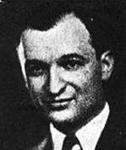(Nov. 25, 1903-Mar. 20, 1950). Milton Steinberg was born in Rochester, N.Y. He studied at New York City College, where he came under the influence of American philosopher, Morris Raphael. The Jewish Theological Seminary of America, New York, ordained him a rabbi in 1928. There he became a disciple of Rabbi Mordecai M. Kaplan, the founder of the Reconstructionist movement in .
Steinberg was an intern at Congregation Beth-El in Indianapolis during his senior year at seminary. Upon ordination, the Congregation invited him to be its rabbi. Under Steinberg’s tenure, congregations Beth-El and Ohev Zedeck merged, to become , in 1928. Steinberg Introduced liturgical and educational innovations and social justice programs, transforming the traditionalist Eastern European and Hungarian congregations into a fully modern, American congregation, aligned with the Conservative movement and the nascent Reconstructionist ideology.
After five years in Indianapolis, Steinberg accepted the call to the pulpit of the Park Avenue Synagogue in New York, where he served until his untimely death in 1950, at the age of 47. His was a short-lived, but brilliant, productive, and influential career. He is remembered as an eloquent and inspiring speaker, a caring pastor, and an ambassador of the Jewish people to the civic and interfaith communities. Steinberg wrote extensively about the meaning of God, on faith and reason in the modern world, on antisemitism, American Jewish identity, and Zionism.
His two most popular books were (1939) and (1947). , considered one of the best American Jewish novels, is the story of a second-century rabbi, Elisha Ben Abuya, whose fascination with Greek thought caused him to be regarded as a heretic. Steinberg was a classics scholar enamored with Greek philosophy, who seems to identify with Elisha, the honest skeptic, in his religious struggle.
is one of the clearest and most beautifully written introductions to Judaism. It holds in creative tension modern thought and reason with traditional, Jewish faith and practice. While the “traditionalist” position is presented faithfully and respectfully, Steinberg upholds the “modernist” outlook, essentially the Reconstructionist version of Judaism. Like Mordecai Kaplan, Steinberg understands Judaism to be more than a faith or religion. It is the historic, evolving, and diverse civilization or culture of the Jewish people. It includes language and literature, music and the arts, folkways, folklore, laws, ethics, religious and social institutions.
Milton Steinberg rejected the classical notion of an all-powerful, all-knowing God capable of altering the order of nature through miracles. If God is all good, how can there be evil; if all-powerful, why doesn’t God subdue it; if all-knowing, what is the divine excuse? Steinberg proposed the doctrine of “limited theism”: God is an eternal, conscious being whose will is unfailingly good, whose love is infinite, but whose power is limited. The evil and unjust realities of the world are not the works of a good God. God’s will for good is infinite, but God’s power over evil is finite. So, God needs our help. This limitation of the divine requires human freedom of will and effort. Humans are partners of God in advancing and completing the works of creation and redemption.
Steinberg was a popular speaker and wrote prolifically about Jewish history and life in modernity. In The Making of (1934) and in (1945) he examines the interplay of past and present in the making of contemporary Judaism. Collections of his essays published posthumously include (1951), Anatomy Of Faith (1960), and an unfinished novel, (2010).

Help improve this entry
Contribute information, offer corrections, suggest images.
You can also recommend new entries related to this topic.





